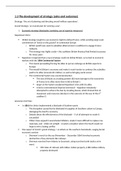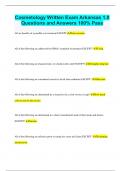Strategy: ‘the art of planning and directing overall military operations’.
Grand Strategy: ‘an overall plan for winning a war’.
1. Economic strategy (blockades, bombing, use of superior resources)
Napoleonic Wars:
British strategy sought to use economic might to defeat France, while avoiding large-scale
commitment of ‘boots on the ground’ in continental Europe
o British wealth was used to subsidise allied armies in coalitions to engage France
militarily
o This strategy was highly costly + the coalitions Britain financed had limited successes
for many years
Napoleon recognised that a naval strategy could not defeat Britain, so turned to economic
warfare with the 1806 Continental System
o This meant persuading/forcing his allies to put an embargo on British exports to
Europe
o This would hit Britain’s economy and make it much harder to continue the subsidies
paid to its allies (around £65 million), as well as bringing social unrest
o The Continental System was counterproductive
The loss of Britain as a trading partner did more damage to the economies
of France & its allies more than it did to Britain’s
Anger at the System weakened Napoleon’s ties with his allies
It led to overextension/imperial overreach – Napoleon mistakenly
attempted to enforce the ban by invading Russia, which drained him of
manpower and resources (decisive in the outcome of the war of the 6 th
coalition?)
American Civil War:
in 1861 the Union implemented a blockade of Southern ports
o The disruption caused by the blockade hit supplies of Southern cotton to Europe,
damaging the South’s economy
o Debate about the effectiveness of the blockade – ¾ of all attempts to evade it
succeeded
o Others have argued it exacerbated inflation, made it more difficult to replace raw
materials, and - while not airtight - created a situation where the South could not
hope to win a lasting conflict
One aspect of Grant’s grand strategy = an attack on the southern homelands, waging brutal
economic warfare
o Sherman’s march to the sea (November – December 1864) involved economic
destruction of key elements like railways
o Sherman marched from Atlanta to Savannah, using scorched earth tactics as he
went:
200 miles of railroad, $20 million civilian property, $180 million military
property destroyed
, First World War:
Allies used economic warfare to blockade Germany (able to do this due to supremacy of
British Royal Navy). Blockade lasted from 1914 to 1919; considered a key element in
outcome of the war
o No cargo destined for Germany allowed to reach its destination; even foodstuffs
considered a ‘contraband of war’
o Devastating impact on German economy, which before the war had relied v. heavily
on imports (approx. 25-30% of food was imported pre-1914)
o By 1915 Germany’s imports had fallen by 55% from its pre-war levels
o Blockade made a large contribution to the outcome of the war. Shortages of vital
raw materials e.g coal ––> Germans unable to produce as many war-supplies
o Food shortages led to starvation among the German people. Debatable how many
starved but many thousands went hungry = loss of morale on home front and
among troops
o The German home front collapsed because of the British naval blockade & war
became unsustainable; no choice but to surrender
Germans tried to counter the blockade with the U-boat, technology capable of subverting
British naval superiority
o Could be devastating (sinking of the Lusitania)
o Generally ineffective – 1917 British adopted the ‘convoy system’ which successfully
countered the U-boats
o Policy of ‘unrestricted submarine warfare’ introduced in 1917 provoked USA into
entering the war; counterproductive, like the Continental System
The Second World War:
German submarine war on Atlantic supply routes scored early successes. Churchill: ‘U-boat
peril’. Battle of the Atlantic
o Attempt to starve Britain into submission
o Big impact on amount of dry cargo reaching Britain
U-boat tactics
o Wolf-pack tactics developed to target Allied ships
o USA initially slow to catch on to idea of convoy system – number of ships lost
increases when America joins the war
Allies regain initiative in the Battle of the Atlantic in 1943
o Germans lack aircraft carriers
o Convoy system limits losses
o German production is slow
Allied bombing campaign sought to diminish Germany’s war capacity by targeting industrial
centres
o Allied air supremacy enabled them to destroy the Luftwaffe but also much of
Germany’s war economy
o Bombing reduced industry, lines of communication, and oil production
Heavy bombing raids on Germany affected its industrial capacity (but not decisively?)





